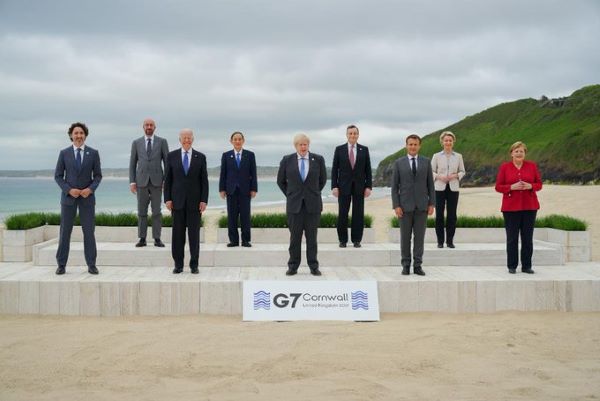
R Krishna Das
Before the leaders of Group of Seven (G-7) could pack up from Cornwall in England, China unexpectedly came out with a strongly worded statement taking a jibe at the summit.
“The days when global decisions were dictated by a small group of countries are long gone,” a statement from the Chinese embassy in London said. The reference was to the G-7 summit, the first face-to-face meeting since 2019 on Saturday where the leaders from Britain, France, Germany, Italy, Japan and the European Union supported a US-led global infrastructure plan called Build Back Better World (B3W).
“We always believe that countries, big or small, strong or weak, poor or rich, are equals, and that world affairs should be handled through consultation by all countries,” it added. The official stand of China has given an overt signal; Beijing is appearing to stand firm as Washington tries to rally its allies to counter China’s economic reach and address alleged human rights abuses.
The statement came just hours after leaders of the G-7 advanced economies wrapped up its second day of discussions in the seaside resort of Carbis Bay in southwest England.
“There is only one set of rules for the world, that is, the basic norms of international relations based on the purposes and principles of the United Nations Charter, not the so-called rules formulated by a small number of countries,” it said. China is eyeing at the countries that were sceptical of the Biden administration’s China-focused strategy.
The B3W plan would “collectively catalyse” hundreds of billions of investment” needed by developing nations, in a bid to compete with China’s Belt and Road Initiative, Chinese President Xi Jinping’s signature foreign policy and overseas investment scheme. And experts said the plan was “not good news for China”.
All of the stated goals of the B3W, described as a values-driven, transparent and sustainable infrastructure partnership, are obviously targeting China. The announcement of the plan comes as the administration of US President Joe Biden reviews its China policy and steps up its alliance-based strategy to push back against China’s diplomatic and military assertiveness besides alleged abuses over Xinjiang and Hong Kong. It also comes as the US economy bounces back from recession, with the United States and Britain making big gains in controlling the pandemic.
A leading foreign affairs expert said Beijing should have refrain from jumping to hasty conclusions that everything at the summit was about containing China. It indicated that China was desperate and stumped over the summit.
After all, European leaders, particularly French President Emmanuel Macron and outgoing German Chancellor Angela Merkel, are wary of further antagonising China, considering their close trade ties with Beijing and China’s importance to the global climate fight.



